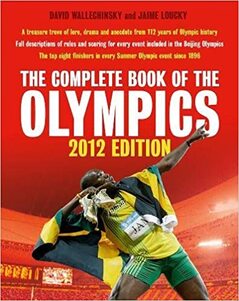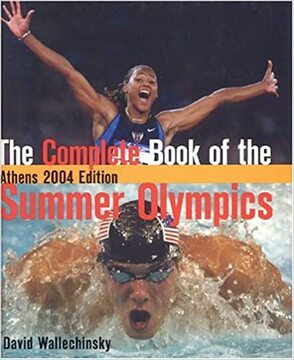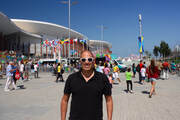Wherefore Art Thou, The Complete Book of the Olympics?
 2012 was the last edition for the Summer Games
2012 was the last edition for the Summer Games And not only that, many results came with commentary on the results, often remarkable in detail. The listing for the infamous Los Angeles 1984 women's 3000 meters track event - i.e. Mary Decker vs Zola Budd - spans eight columns across five pages, offering a remarkable look at both the context and aftermath of the race. I devoured stories such as Cassius Clay's post-Rome 1960 victory experience, where continued discrimination back home soured his Olympic retrospective.
The books were a treasure trove of anecdotes, quotes, and obscure information. Did you know that Barcelona 1992 rowing gold medalist Marnie McBean first took up the sport by looking up "Rowing" in the Toronto phone directory at age 16? Or, that Japan's swim team at Los Angeles 1932 were the first to "inhale oxygen before and after their races"? Paris 1924 high diving (a discontinued event) champion Richmond Eve was eventually declared ineligible for future competition by a New South Wales association...of which his brother was secretary. One could go on and on...
The books were a passion project of author and researcher David Wallechinsky, who fell in love with the Games in 1960. Possibly best known as the man behind The Book of Lists, Wallechinsky was well-built to tackle the data and insight of the Olympics ahead of the first publication in 1984. More than thirty years' worth of editions spanning both Summer and Winter Games followed, as The Complete Book became "the preeminent point of reference for sports enthusiasts and journalists alike", and the "essential companion to the greatest sporting festival in the world". Any other attempt at a Games preview paled in comparison.
 The unfortunate last winter edition
The unfortunate last winter edition However, Sochi 2014, unfortunately a production not up to standards of past, proved to be the last. Between the time commitment and weighing cost-effectiveness, Wallechinsky and team didn't offer a Rio 2016 version. Certainly, the research time needed increased substantially as, more and more, results changed years later across Games with the re-adjustment of results following various belated drug disqualifications. By January 2020 alone, there were 60 disqualifications from London 2012 and Beijing 2008 weightlifting. How can one keep up?
The dominant rise of the internet also undoubtedly played a part. Publishing, and adjusting, results is definitely easier online. Today, one can find results informally through Wikipedia, or through various blog-ish projects such as Olympstats.com, Olympiandatabase.com, Totallympics or even on the IOC's Olympics.org itself. Perhaps the closest inheritor to The Complete Book's perch is Olympedia, a wonderful backlog of results with athlete bios and more, offered by a consortium of Olympic researchers.
 $809 USD can get you a "new" 2004 edition (click on image)
$809 USD can get you a "new" 2004 edition (click on image) I know that the books helped deepen my own Olympic passion, based on the hours spent cherishing what they offered. The 2012 and 2014 editions, despite continued post-Games disqualification changes to the results, still reside on my Olympic bookshelf, testaments to the place they have for me in Olympic fandom. As Tokyo 2020 approaches, I'm sure to revisit them.


 RSS Feed
RSS Feed